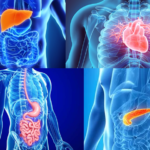

We have helped organize the Genetics of Obesity-Related Liver Disease (GOLD) Consortium in which we found that NAFLD is about 25%–30%

Through collaborative efforts in the Genetics of Anthropometric Traits Consortium (GIANT) we have have now identified > 1000 loci that associate with body mass index

We have made cellular and mouse models of NAFLD and obesity using lentiviruses, cas9/CRISPR technology and chemical/drug perturbations to define the mechanism of action of the genes that are implicated from GWAS analyses.

We are interested in how genetics influences obesity and related human diseases in the real world.
Obesity and NAFLD
Obesity and its complications, including nonalcoholic fatty liver disease (NAFLD), have reached epidemic proportions, affecting over a quarter of the world’s population. Even in our current obesogenic environment however, some people do not develop obesity and not all individuals with obesity develop complications related to their obesity, such as NAFLD. The propensity to become obese or develop NAFLD is partially heritable or genetic and our group has already helped identify many genetic variants that predispose individuals to developing obesity and NAFLD. Some of these variants predispose to multiple metabolic diseases whereas others do not helping to partially explain why some people will develop some but not other complications of obesity. Our group aims to further define the genetic and environmental influences that predispose individuals to obesity and NAFLD and translate that information into better ways to diagnose, manage, and treat these conditions in the future.





